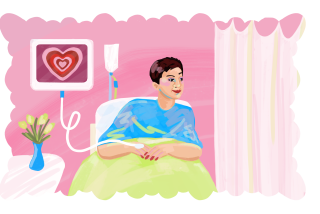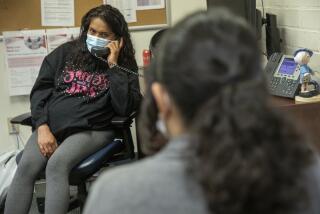‘In a Time of Need, They Hung Up on Me’
- Share via
In times of crisis, most people turn to their spouse, caring family members or sensitive friends. But what happens when you don’t have that support system?
In my hour of need, I called a health clinic in Culver City, taking the phone number from a brochure I had saved.
The clinic gave me five referrals to inexpensive Spanish-speaking counseling centers close to my home in the Valley. With referrals in hand, a positive feeling replaced my initial anxiety. I was on my way to getting help. However, what followed was anything but the support I was seeking.
My first call was met with the familiar click of an answering machine followed by the requisite beep. Wasn’t there a live person I could speak to confidentially? Feeling uneasy, I took a deep breath and left a message.
When I called the second referral, I reached an apathetic woman who informed me in a rapid tone that the sliding fee scale for services ranged from $19 to $110. $110? A sliding fee what? “Does anyone speak Spanish there?” I asked. “No,” she replied.
Referral No. 3: $35 for the first session, $20 for each additional session. Still pricey, but they had Spanish-speaking counselors. “There’s a two-week waiting list for bilingual counselors,” she informed me. Anxiety crept back in.
The receptionist at the fourth place put me on hold before I could get a word in. Things only worsened when she returned to the line. The clinic was too far away.
Referral No. 5 was an 800 information hotline. After hearing my situation, the man took my zip code and put me on hold. He came back to the line with new set of referrals. I was back to square one.
Anger had given way to fatigue. My emotions spiraled from hope to despair. I thought about giving up, but a glimmer of hope was restored when I looked at the next referral’s Spanish name. I trudged on.
When a Spanish-speaking receptionist said I had arrived at the appropriate place (referral No. 6), I was elated that my persistence paid off. “But you need to speak to Walter,” she added, “And he’s busy right now.” She assured me that if I left a message, he’d call back. I left word without expectation.
Referral No. 7: Verdugo Mental Health Center, a contracted clinic for the Los Angeles County mental health care system. The woman who answered the phone put me on hold several times without warning, but I was already conditioned for this unfriendly response. I felt defeated and was willing to take what was handed to me. She popped back on the line and asked where I lived, and once again placed me on hold before I could answer. But this time, something snapped. I had finally reached my tolerance level. When she came back the fourth time, I said in the most composed voice I could muster, “I must tell you I’m very frustrated right now. I’ve been reaching out for help for over an hour and I’ve been put on hold so many times.” Click. Dead silence. The woman at the clinic, the place where I called to get help in a time of crisis, deliberately hung up on me.
I was shocked. Then angry. And then close to tears as I held the dead receiver in my hand.
Ironically, the help I so desperately sought wasn’t for me, but for my disabled Spanish-speaking neighbor who had recently lost his wife. And I wasn’t just a good Samaritan. I am a first-year graduate student in clinical psychology at Pepperdine University. So when my despondent neighbor tearfully told me about his trouble, I was sure I could do something to help. I naively believed that help was literally a phone call away.
What I didn’t know was that this was going to be an exercise in futility. I can’t imagine what the experience would have felt like had I had actually been the person seeking help. How lonely. How awful.


